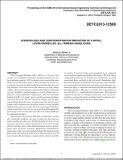| dc.contributor.author | Winter, Amos G. | |
| dc.date.accessioned | 2017-05-19T22:55:21Z | |
| dc.date.available | 2017-05-19T22:55:21Z | |
| dc.date.issued | 2013-08 | |
| dc.identifier.isbn | 978-0-7918-5592-8 | |
| dc.identifier.uri | http://hdl.handle.net/1721.1/109236 | |
| dc.description.abstract | The Leveraged Freedom Chair (LFC) is a low-cost, all-terrain, lever-propelled wheelchair designed primarily for use in developing countries. LFC technology was conceived because 70 percent of wheelchair users in these markets live in rural areas and no currently available mobility aid enables them to travel long distances on rough terrain and maneuver in tight, indoor confines. Because developing world markets impose constraints on cost, durability, and performance, a novel solution was required to satisfy stakeholder requirements. The key innovation behind the LFC is its single speed, variable mechanical advantage lever drivetrain. The user effectively changes gear by shifting his hands along the levers; grasping near the ends increases torque, while grasping near the pivots enables a larger angular displacement with every stroke, which increases speed. The drivetrain is made from low-cost bicycle parts found throughout the developing world, which enables the LFC to be sold for $200 and be repairable anywhere.
During three user trials in East Africa, Guatemala, and India, stakeholder feedback was used to refine the chair between trials, resulting in a device 9.1 kg (20 lbs) lighter, 8.9 cm (3.5 in) narrower, and with a center of gravity 12.7 cm (5 in) lower than the first iteration. Survey data substantiated increases in performance after successive iterations. Quantitative biomechanical performance data were also measured during the Guatemala and India trials, which showed the LFC to be 76 percent faster and 41 percent more efficient during a common daily commute, and able to produce 53 percent higher peak propulsion force compared to conventional, pushrim-propelled wheelchairs. The LFC offers comparable performance at less than one-twentieth the cost of off road wheelchairs available in the rich world. Stakeholder feedback and the highly-constrained environment for which the LFC was created drove the technology towards a novel, innovative solution that offers a competitive advantage in both developing and developed markets. The paper concludes with a description of how the LFC is a “constraint-driven innovation.” This idea ties together the theories of “disruptive innovation” and “reverse innovation,” and may be used as a design tool for engineers striving to create technologies that have global impact. | en_US |
| dc.description.sponsorship | Singapore University of Technology and Design | en_US |
| dc.description.sponsorship | Inter-American Development Bank | en_US |
| dc.description.sponsorship | National Collegiate Inventors and Innovators Alliance | en_US |
| dc.description.sponsorship | D-Lab (Massachusetts Institute of Technology) | en_US |
| dc.description.sponsorship | Clinton Global Initiative | en_US |
| dc.description.sponsorship | Massachusetts Institute of Technology. Office of the Dean for Graduate Education (Hugh Hampton Young Memorial Fellowship) | en_US |
| dc.description.sponsorship | Massachusetts Institute of Technology. Department of Mechanical Engineering | en_US |
| dc.description.sponsorship | Massachusetts Institute of Technology. Public Service Center | en_US |
| dc.description.sponsorship | Massachusetts Institute of Technology. Edgerton Center | en_US |
| dc.description.sponsorship | Massachusetts Institute of Technology. Undergraduate Research Opportunities Program | en_US |
| dc.description.sponsorship | California Environmental Protection Agency. Air Resources Board | en_US |
| dc.language.iso | en_US | |
| dc.publisher | ASME International | en_US |
| dc.relation.isversionof | http://dx.doi.org/10.1115/DETC2013-12588 | en_US |
| dc.rights | Article is made available in accordance with the publisher's policy and may be subject to US copyright law. Please refer to the publisher's site for terms of use. | en_US |
| dc.source | American Society of Mechanical Engineers (ASME) | en_US |
| dc.title | Stakeholder and Constraint-Driven Innovation of a Novel, Lever-Propelled, All-Terrain Wheelchair | en_US |
| dc.type | Article | en_US |
| dc.identifier.citation | Winter, Amos G. “Stakeholder and Constraint-Driven Innovation of a Novel, Lever-Propelled, All-Terrain Wheelchair.” Volume 5: 25th International Conference on Design Theory and Methodology; ASME 2013 Power Transmission and Gearing Conference (August 4, 2013). © 2013 ASME International | en_US |
| dc.contributor.department | Massachusetts Institute of Technology. Department of Mechanical Engineering | en_US |
| dc.contributor.mitauthor | Winter, Amos G. | |
| dc.relation.journal | Volume 5: 25th International Conference on Design Theory and Methodology; ASME 2013 Power Transmission and Gearing Conference | en_US |
| dc.eprint.version | Final published version | en_US |
| dc.type.uri | http://purl.org/eprint/type/ConferencePaper | en_US |
| eprint.status | http://purl.org/eprint/status/NonPeerReviewed | en_US |
| dspace.orderedauthors | Winter, Amos G. | en_US |
| dspace.embargo.terms | N | en_US |
| dc.identifier.orcid | https://orcid.org/0000-0002-4151-0889 | |
| mit.license | PUBLISHER_POLICY | en_US |
